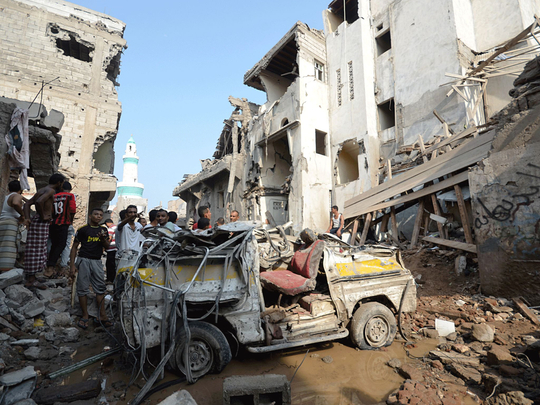
Though limited, the ceasefire deal in two key cities — Hodeida and Taiz — agreed to by both sides in Yemen’s war, is a welcome relief for the devastated country. To say that this deal could have come about without the Saudi-led coalition’s sustained military pressure on the Al Houthi militia would be disingenuous. The military intervention by the coalition, which began in 2015 after the militia seized capital Sana’a as well as the Red Sea port city of Hodeida, paved the way for diplomatic progress in Sweden.
On Thursday, the militia agreed to withdraw from the ports of Hodeida, Al Saleef and Ras Eisa within 14 days and a complete withdrawal from Hodeida city within 21 days. An agreement was also reached on opening three humanitarian corridors in Taiz to be overseen by UAE forces. The United Nations Security Council convened in a special session on Friday to look into the deal on Yemen.
From the moment the conference began in Stockholm, there were signs of hope. There was a seriousness to achieve results that were not seen earlier. The UN deserves credit for its efforts, especially in establishing confidence-building measures, such as the exchange of prisoners. The speed with which both sides reached agreement on the truce came as a pleasant surprise. All eyes are now on the next round of talks in Kuwait in January.
Hodeida was the litmus test for the Sweden talks. The fate of the city has emerged as the key factor in the war. The decision on reopening Hodeida port is also the most important breakthrough: The Red Sea port handles 80 per cent of Yemen’s food imports. And given the famine-like situation in the country, this decision could not have come sooner. International aid agencies can now bring in humanitarian supplies on a scale previously unthinkable. The city itself is home to 600,000 people — half of whom are children and have suffered the most in the civil war.
However, challenges remain. Sporadic clashes broke out on the outskirts of Hodeida on Friday, the first violence to hit the city since the truce.
Also, at the conference, there has been no agreement on a ceasefire in the rest of Yemen. The onus is now on the UN and the international community to put pressure on the Iranian regime to stop its support for Al Houthi militia. Pressurising the militia — and its regional sponsor — is necessary to cement the initial gains and keep the delicate process from collapsing.








